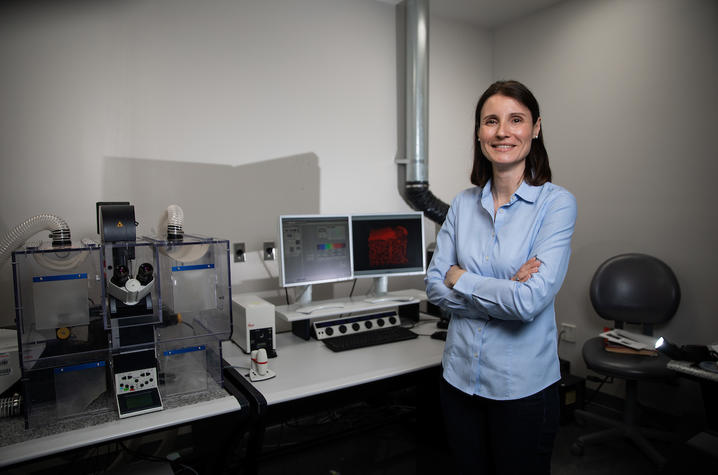UK study: Chemicals in plastics could be a risk factor for Alzheimer’s
LEXINGTON, Ky. (Feb. 28, 2024) — Researchers at the University of Kentucky are studying how elements of our natural surroundings can be potential risk factors for Alzheimer’s disease — including chemicals widely used in plastics.
“Identifying environmental risk factors for Alzheimer’s is critical to mitigate cognitive decline in humans,” said Anika Hartz, Ph.D., a professor with a joint appointment in the Department of Pharmacology and Nutritional Sciences in the College of Medicine and the Department of Pharmaceutical Sciences in the College of Pharmacy. She is the study’s principal investigator.
“Bisphenols can accelerate Alzheimer’s disease and lead to cognitive deficits. Simply: Be smart and stay smart by avoiding plastics.”
Hartz is also affiliated with the UK Sanders-Brown Center on Aging (SBCoA), one of the nation’s leading centers on aging, Alzheimer’s disease and related neurodegenerative disorders and one of 33 National Institute on Aging funded Alzheimer’s Disease Research Centers in the United States.
Alzheimer’s is a progressive and irreversible neurological disorder. It’s estimated that 6.2 million Americans aged 65 and older are living with the disease that affects cognitive function, memory and behavior.
The study titled “Bisphenol-Induced Blood-Brain Barrier Dysfunction in Alzheimer’s Disease” is funded by a grant from the National Institute of Neurological Disorders and Stroke, part of the National Institutes of Health (NIH).
Hartz and her colleagues are examining three types of bisphenols (BPA, BPF and BPS), which are chemical compounds used in the production of polycarbonate plastics and epoxy resins. These compounds are commonly found in food containers, water bottles and the lining of cans.
“Human exposure to bisphenols is inevitable due to their widespread presence in the environment,” said Hartz. “Our data show that bisphenols trigger blood-brain barrier dysfunction and memory problems, both hallmarks of Alzheimer’s, indicating that environmental bisphenols are a critical yet underrecognized risk factor for the disease.”
Hartz’s research team provided some of the first evidence that the chemicals are a clinically relevant environmental risk factor for Alzheimer’s. Bisphenols are a concern because previous research has shown they can affect the endocrine system, which regulates hormones. The brain plays a complex role in that system.
UK researchers want to better understand how the chemicals’ disruption of the endocrine system impacts the blood-brain barrier function, potentially driving cognitive decline and accelerating Alzheimer’s disease.
“The goal of this project is to develop fundamental knowledge of environmental impacts on human health that will help promote healthier lives and reduce the burden of diseases and conditions related to aging,” said Hartz. “New insights are expected from our study that will open the door for future evidence-based health management aimed at preserving cognition in health and disease.”
The work builds on preliminary data funded by a pilot grant from the UK Center for Appalachian Research in Environmental Sciences (UK-CARES).
“Without the pilot funding, the strong support of the UK-CARES leadership Drs. Ellen Hahn and Erin Haynes, the entire UK-CARES team, my colleagues Drs. Bjoern Bauer, Kevin Pearson, Richard Kryscio, Bernhard Hennig, Peter Nelson, Scott Stanley and the continuous support from Dr. Linda Van Eldik and the team at the Sanders-Brown Center on Aging, this would have not been possible,” said Hartz.
This study brings together a multidisciplinary group of researchers spanning the colleges of Medicine, Pharmacy, Public Health and Martin-Gatton College of Agriculture, Food and Environment.
Research reported in this publication was supported by the National Institute of Neurological Disorders and Stroke of the National Institutes of Health under Award Number R01NS133250 and the National Institute of Environmental Health Sciences of the National Institutes of Health under Award Number P30ES026529. The content is solely the responsibility of the authors and does not necessarily represent the official views of the National Institutes of Health.
UK HealthCare is the hospitals and clinics of the University of Kentucky. But it is so much more. It is more than 10,000 dedicated health care professionals committed to providing advanced subspecialty care for the most critically injured and ill patients from the Commonwealth and beyond. It also is the home of the state’s only National Cancer Institute (NCI)-designated Comprehensive Cancer Center, a Level IV Neonatal Intensive Care Unit that cares for the tiniest and sickest newborns and the region’s only Level 1 trauma center.
As an academic research institution, we are continuously pursuing the next generation of cures, treatments, protocols and policies. Our discoveries have the potential to change what’s medically possible within our lifetimes. Our educators and thought leaders are transforming the health care landscape as our six health professions colleges teach the next generation of doctors, nurses, pharmacists and other health care professionals, spreading the highest standards of care. UK HealthCare is the power of advanced medicine committed to creating a healthier Kentucky, now and for generations to come.






